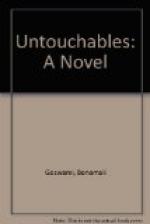
|
| Name: _________________________ | Period: ___________________ |
This test consists of 15 multiple choice questions and 5 short answer questions.
Multiple Choice Questions
1. On page 9, what does the narrator compare Bakha's capacity for work to?
(a) Wind shaking the leaves.
(b) The shining of glass.
(c) The burning of a fire.
(d) Water flowing from a stream.
2. Why is the younger of the babu's sons so eager to get going during their conversation with Bakha and his friends?
(a) He knows that there are sweets waiting for him at home.
(b) He does not want to be late to school.
(c) He is afraid his mother will catch them talking to outcastes.
(d) He does not want to risk ritual pollution.
3. Why does Bahka not immediately apologize when he is accused of bumping the man in the street?
(a) He thinks the idea of ritual pollution is ridiculous.
(b) He does not think he really bumped the man.
(c) He is paralyzed with fear.
(d) He does not hear what the man is saying, at first.
4. Who are the few men who come to the latrines wearing long white tunics and loose trousers?
(a) Sepoys.
(b) Priests.
(c) Fakirs.
(d) Muslims.
5. What habit of the British soldiers did Bakha find "Disgraceful" (12)?
(a) Singing while bathing.
(b) Hurrying naked toward their bathtubs.
(c) Touching their genitals while bathing.
(d) Bathing with their undergarments still on.
6. Where did Bakha get his British jacket and overcoat?
(a) They were prizes he won for playing hockey.
(b) They were a gift from his uncle.
(c) He bought them with his tip money.
(d) He found them in a rubbish bin.
7. How old is Bakha?
(a) 17.
(b) 16.
(c) 18.
(d) 15.
8. What does the narrator explain with the phrase "set a thief to catch a thief" (38)?
(a) The corruption of the Indian police.
(b) The aggression of the man Bakha bumped.
(c) The dishonesty of the street urchin.
(d) The anger of the crowd around Bakha.
9. When the priest claims to have been "defiled by contact," what does Bakha assume (51)?
(a) There must be a third, as yet unseen, outcaste nearby.
(b) His sister must have touched the priest.
(c) He must have touched the priest on his way past him.
(d) The priest is lying.
10. What does Sohini first tell her brother the priest did to her?
(a) Made improper sexual suggestions.
(b) Grabbed her breasts.
(c) Chastised her for not cleaning properly.
(d) Threatened to get their father in trouble.
11. Who is the author of Untouchable?
(a) Mulk Raj Anand.
(b) Khushwant Singh.
(c) Sarat Chandra Chattopadhyay.
(d) R. K. Narayan.
12. What does the priest inside the temple do to indicate the beginning of services?
(a) He strikes a five-headed drum.
(b) He rings a series of bells.
(c) He blows on a conch shell.
(d) He hits a small gong.
13. What causes Bakha to pause before entering the town?
(a) He hears his sister calling from their house.
(b) He is enjoying the sunshine.
(c) He is dreading going into the town.
(d) He sees his friends coming toward him.
14. What is so soothing to Bakha about the smaller street, familiar to him since childhood, that he turns into when he leaves the crowded bazaar?
(a) The smell of spices from the spice merchants' shops.
(b) The feeling of the much cooler air against his skin.
(c) The sound of the children playing marbles.
(d) The sight of the English musical instruments.
15. What does the priest tell Sohini he wants her to do?
(a) Bring an offering to the temple goddess.
(b) Consider devoting herself as a temple servant.
(c) Tell her father that the temple courtyard needs more frequent cleaning.
(d) Clean the courtyard of his house at the temple.
Short Answer Questions
1. What does Charat Singh offer Bakha?
2. What habit of Indian people in this time period was the basis of a derogatory description used by the British soldiers?
3. What finally rouses Bakha from his bed at the beginning of the book?
4. After he is finally free of the crowd in the street, what does Bakha suddenly realize is at the root of all of his problems?
5. What does the narrator say that the word "sahib" refers to (5)?
|
This section contains 725 words (approx. 3 pages at 300 words per page) |

|




